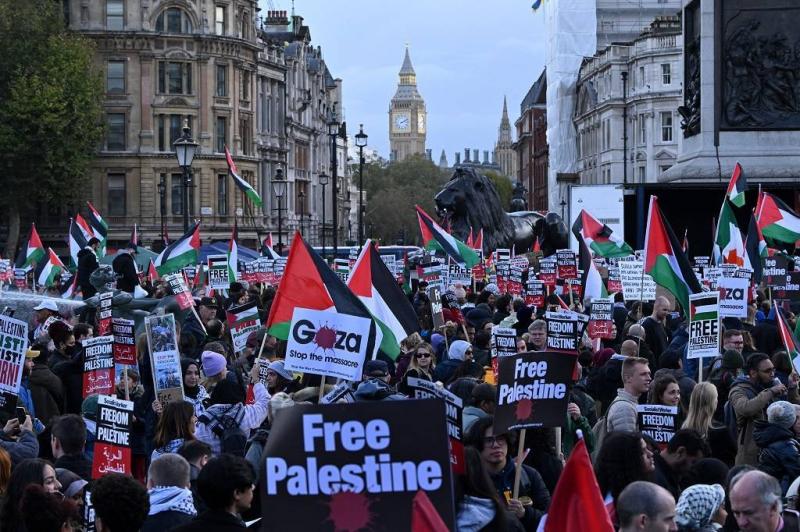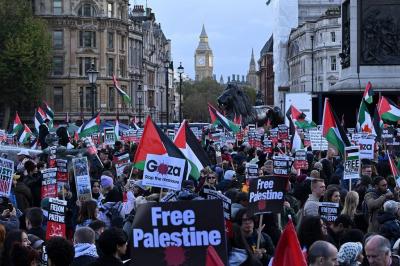Gian Omar, a member of the Berlin parliament of Syrian Kurdish descent, feels he is not protected by the police after being targeted with hate-filled postings mixed with glass and feces, a broken window, and an assault with a hammer since the Palestinian Hamas attack on Israel on October 7. More than 30 community leaders and advocates consulted by Reuters stated that the three incidents at Omar's campaign office are part of the growing hostility towards Muslims in Europe, which has sometimes been fueled by politicians since the Hamas attack. They added that other incidents remain unreported due to a lack of trust in the police. Omar said, "I feel really alone, and if a person with elected responsibility cannot be protected, how should others feel?" He noted that the police are investigating but informed him they cannot provide more security at his office. He continued, "Imagine if a white German politician had been attacked by an immigrant or a refugee," suggesting that security forces would act more vigorously in such cases. The Berlin police have not responded to a request for comment.
Hate crimes have increased significantly in Europe since the October 7 attack, which Israel states resulted in approximately 1,200 deaths, and the subsequent Israeli invasion and bombing of Gaza, which has led to over 15,000 Palestinian deaths, with recorded anti-Semitic incidents rising by 1240 percent in London, along with sharp increases in France and Germany. Official data shows a significant but smaller rise in anti-Muslim incidents in the UK, with variations in the other two countries. The data does not fully represent the extent of the attacks and hostility faced by individuals and mosques, including children targeted in schools, according to those consulted by Reuters, some of whom requested anonymity out of fear of retaliation.
Jewish groups and leaders in the three countries noted that unreported incidents are also common among victims of anti-Semitism. Zara Mohammed, the Secretary General of the Muslim Council in Britain, remarked that the language used by the government, such as describing pro-Palestinian protests as "hate marches," has made the fight against anti-Semitism and for the rights of Muslims or Palestinians a zero-sum game in the minds of many. She added, "Ministers have been really reckless, and this promotion of culture wars and incitement of communities against each other is unhelpful, truly divisive, and very dangerous." The British government has not responded to inquiries regarding the official use of such language.
The sense of vulnerability among European Muslims has been exacerbated by the electoral victory of far-right populist Geert Wilders in the Netherlands last week, who previously called for banning mosques and the Quran in the country. In the United States, deadly violence against Palestinians has occurred since October 7. At the Ibn Badis Mosque in Nanterre, Paris, elderly worshippers fear attending dawn prayers in the dark, as two attendees mentioned, following a written threat to burn down the mosque in late October from someone apparently sympathetic to the far-right. Rashid Abdouni, the head of the organization overseeing the mosque, reported that a request for additional police protection had not been met. The local police stated they patrol the area but have limited resources. The police did not immediately respond to requests for comment.
French-Moroccan taxi driver Khalil Rabioun, 42, expressed outside the mosque after Friday prayers, "Do I want my daughter to grow up in this climate?"
**Underreporting**
The Tell Mama campaign, or "Tell Mama," reported that attempted arson, verbal abuse, vandalism, and leaving a pig's head at a mosque site were among more than 700 reports of anti-Islam incidents in Britain in the month following the Hamas attack, a sevenfold increase over the previous month. The Tell Mama campaign only reports some incidents to the police with the complainant's consent for action. Abdullah Zikri, Vice President of the French Muslim Council, stated, "The vast majority of Muslims do not file complaints when they fall victim to such acts. Even mosque imams do not want to. They do not want to spend two hours or more at the police station filing a complaint that is often ultimately filed away."
In Germany, Rima Hanano from the NGO Klem stated that the police also often do not record anti-Islam crimes under that designation due to a lack of awareness. For example, attacks on mosques can sometimes be recorded simply as property damage. She added, "Those affected by racism, such as Muslims and those perceived to be Muslim, often worry about approaching authorities because they fear further harm or being disbelieved or portrayed as the perpetrators."
A British government spokesperson stated, "Anti-Semitism or hatred against Muslims or any other form of hatred must never be tolerated," adding that a full police investigation is expected into such attacks. The German Interior Ministry stated it "confronts all forms of hatred, including explicit anti-Islam hatred," noting it conducted a survey this year that provided a better understanding of anti-Muslim racism.
In France, Interior Minister Gérald Darmanin acknowledged an increase in anti-Muslim acts since October 7, although official French figures for 2023 appeared to show a decrease, with 130 incidents recorded by November 14 compared to 188 incidents for the entire previous year. The ministry has not responded to requests for comment. A spokesperson for the French national police also acknowledged that data on anti-Muslim incidents is "incomplete" and relies on victims reporting incidents and added that security agencies are actively monitoring anti-Semitic incidents.
**History**
France and Germany developed institutional mechanisms to address anti-Semitic acts in the aftermath of the Holocaust during World War II and in response to ongoing bias against Jews. Historian Reza Ziya Ibrahim, from King’s College London and author of "Anti-Semitism and Islamophobia: An Intertwined History," noted that the colonial and religious past of Western Europe has also portrayed Islam as regressive and alien, which has contributed to bias within segments of the population and institutions.
Attacks by Islamic extremists in Europe or abroad often have repercussions on the broader Muslim population. Following mosque vandalism and the spreading of anti-Muslim comments by intellectuals on television, French President Emmanuel Macron stated last week that "protecting French Jews should not come at the expense of vilifying French Muslims." Nonetheless, historian Ziya Ibrahim indicated that the French Interior Ministry's decision to ban pro-Palestinian protests as a threat to public order following the Hamas attacks has fostered a perception that Arabs are aggressors and that supporters of Palestinians are driven by anti-Semitism. Amnesty International described the across-the-board ban as disproportionate.
Ayman Mzick from the German Islamic Council emphasized the need for a federal government commissioner addressing anti-Islam hatred to complement the existing commissioners focused on anti-Semitism and anti-Roma racism. He stated, "The fact that we have a large number of commissioners in Germany without one specifically for Islam is, in itself, a form of discrimination."
Recently appointed German Commissioner for Racism Riem Abli-Radovan acknowledged the need for better monitoring after a survey by the Interior Ministry showed that one in every two Germans has anti-Islam views. For some Muslims in Germany, which has welcomed around a million Syrians and just under 400,000 Afghans in recent years, the increasing hostility comes as a surprise.
Ghalia Zghal, who moved to Germany from Syria in 2015, stated she had never encountered any serious issues regarding discrimination. But shortly after October 7, she was pushed twice in one day, and a man screamed at her, "This is my street, not yours." Zghal, who owns a beauty salon in Berlin, added, "I was so shocked that I couldn't even go to the police."




